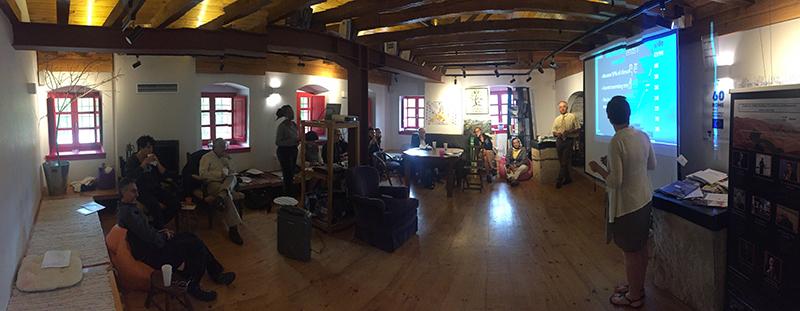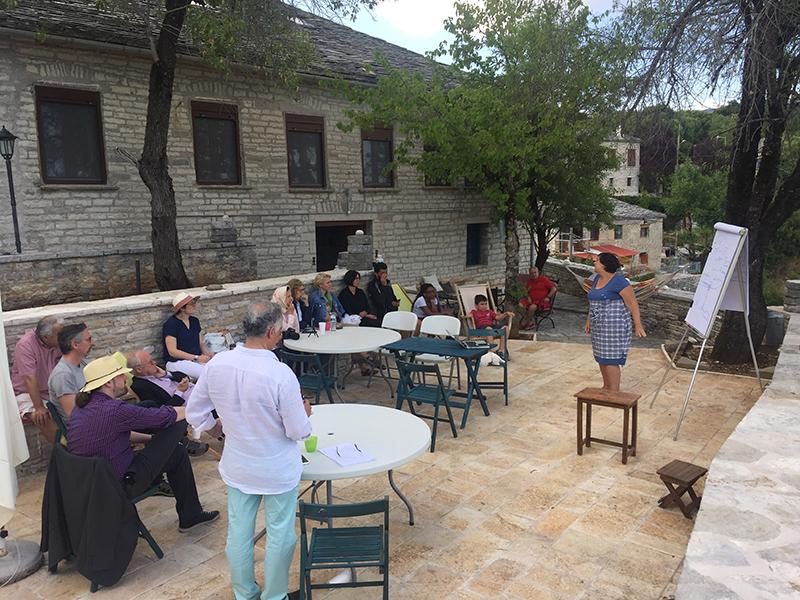GLAP VΙ: Is there Global Climate Justice?, 16-21.07.2017
Center for United Nations Constitutional Research (www.cuncr.org) Mountain Seminar. Τhe land beyond. International Environmental Laws and Climate Change: Is There Global Climate Justice?
16 – 21 July 2017, Vitsa, Epirus, Greece
Building on the experience and outcome of the:
- founding GLAP seminar “Cosmopolitan consciousness and civic action in a globalized world” (2-7.8.2014),
- the GLAP II, on “Global Citizen Education for Sustainable Development” (25-30.7.2015) and
- the GLAP III “Federalist Responses to Global Challenges” (30.7-4.8.2016),
the forth summer six days cosmopolitan peripatetic seminar, which took place at the land beyond in Vitsa, Epiros, Greece (National Park of Northern Pindos), 16-21.7.2017,
had the goal: to help address the doubtful status of environmental rights in international law as global citizen rights, without international environmental court or adjudication in the field of climate change sponsored by the Center for United Nations Constitutional Research.
A group of 20 scholars, University professors and students, professionals working in the field, from diverse nationalities, religions, specialization and age, from the civil society and think tanks, the media, international organizations, met during almost a week in this unique crossroad of thought, nature, spirit and inspiration.
In the resolution that we have adopted using collaborative tools, we stated that,
Climate change is very real and we are approaching the point of no return. Therefore, action to address the adverse effects of global warming is urgently needed. In addition to the strong scientific evidence of serious and possibly irreversible environmental damage caused by anthropogenic climate change, the human impacts are also devastating. Climate change will potentially lead to profound insecurity and war if institutions are not in place and equipped to prevent this global problem.
International Human Rights Law has the potential to provide solutions for victims of climate change, but the framework must be strengthened. We need to identity and create a rights-based and legally-binding approach to redress climate change. Additionally, and related to this, the environment must be recognized as a fundamental right – not merely domestically, but also universally.
Effective and targeted climate finance can empower the countries most burdened by climate change to take ownership in adaptation and sustainable development. To support these efforts, global financial resources must be diverted away from dangerous ends such as continued nuclear arms, and channeled towards the crucial needs of developing countries. Energy transition is a key aspect of fighting climate change.
Given the challenges posed by the international legal structure and the lessons learned in the recent past, the Paris Agreement has generated a complex but relatively familiar framework. Domestically, in passing the first rigorous climate change legislation in 2008, the UK has provided the world with a crucial opportunity to learn from its successes and failures – not least given its complex constitutional environment. Overall, a federalist-style structural arrangement that places a significant onus on localized action, can help us attend properly to the challenge of climate change.
One unifying theme from our discussions on how to achieve climate justice was a strong desire amongst most expert participants to see an explicitly developed and recognized right to environment at the international level. Such a right could be actualized by the United Nations, and this may be best achieved through the empowerment and democratization of the UN and recognition of individual, not just State, rights.
Cleck HERE to see attachment to read the full-text of the Vitsa Declaration, GLAP IV








